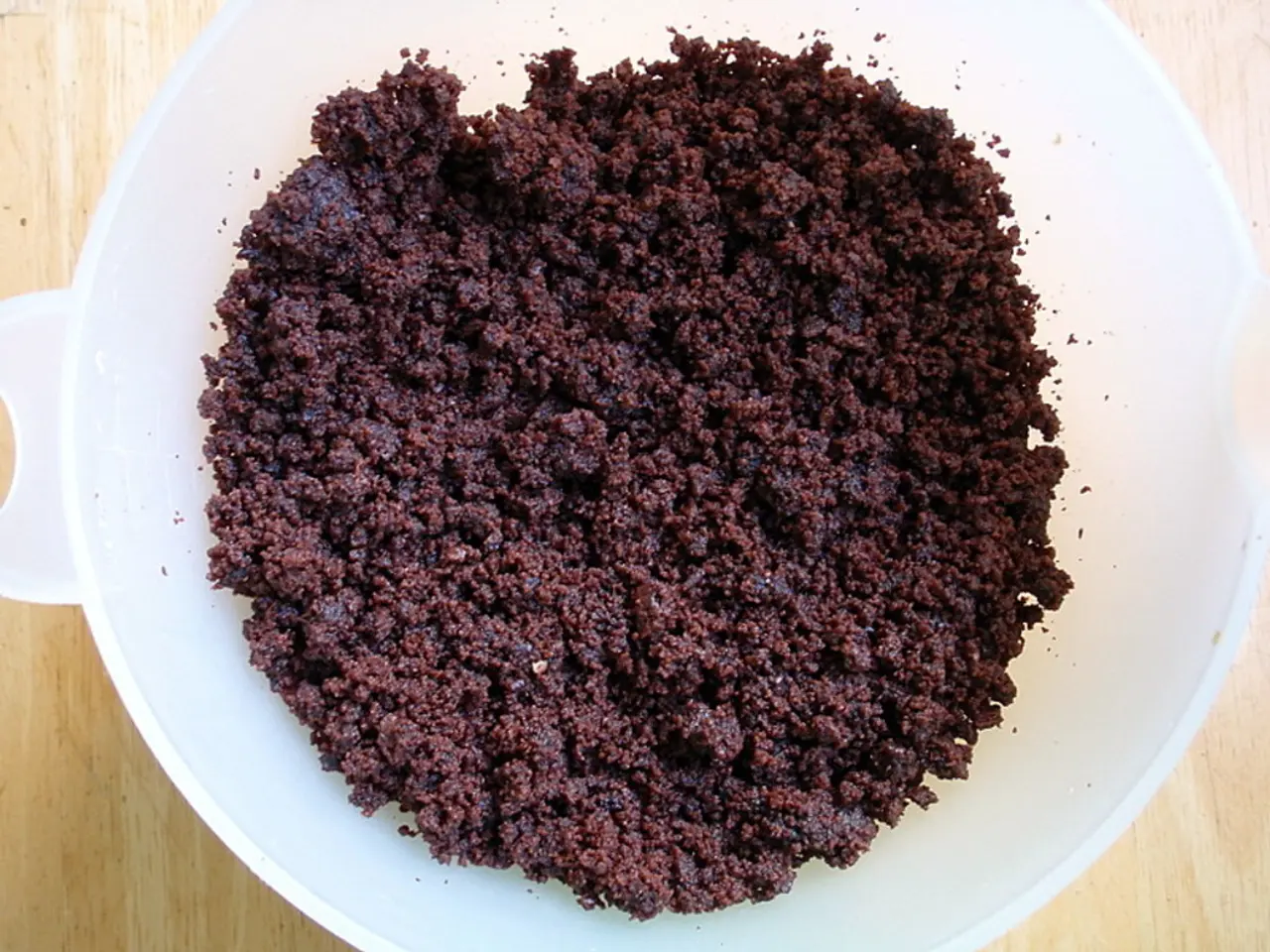Naturally alleviates constipation: Investigation and additional insights
In the United States, constipation is a common issue, particularly among older adults, with around 33% of individuals aged 60 and above experiencing it [1]. However, according to a recent survey, approximately 3 out of 5 Americans have never discussed their constipation symptoms with a healthcare professional [2].
The Dietary Guidelines for Americans recommend that adult females consume about 25 grams of fiber per day, while adult males should aim for 38 grams [3]. To help relieve constipation and maintain good bowel health, guidelines suggest a diet rich in diverse whole grains, fruits, vegetables, legumes, and nuts [4].
Whole grains, such as whole wheat, brown and red rice, millets, oats, and broken wheat, are rich in both soluble and insoluble fiber [1][2]. Fruits like guava, pears, bananas, pomegranates, figs, dates, and others provide significant fiber content and support digestion [1][3][4]. Vegetables like leafy greens, broccoli, Brussels sprouts, carrots, bell peppers, zucchini, and green peas are also good sources of fiber [1][5]. Legumes and nuts, such as lentils, black beans, quinoa, and walnuts, are good sources of fiber that also contribute to overall health and regular bowel function [1][5].
To enable the laxative effects of fiber, it's essential to drink at least 8 glasses of fluid daily [6]. This hydration softens stool, making bowel movements easier. Soluble fiber, found in oats, fruits, vegetables, and beans, acts as a prebiotic, increasing short-chain fatty acids (SCFAs), and forms gels with water to help regulate the consistency of stools [7]. SCFAs may also help regulate the gut-brain axis, which is a factor in irritable bowel syndrome [7].
The European guidelines and the American College of Gastroenterology position paper recommend fiber, mainly soluble fiber, for managing chronic constipation [8]. However, it's important to increase fiber intake gradually to avoid worsening symptoms [2]. Adequate hydration is also crucial for fiber to work effectively and make stools easier to pass [4].
In addition to dietary changes, regular physical activity supports bowel motility, reducing the risk of constipation [4]. Other tips for relieving constipation include doing regular physical activity, having a bowel movement at the same time each day, and relaxing muscles during bowel movements [5]. If constipation persists despite dietary changes and exercise, it's recommended to consult a healthcare professional [9].
Symptoms of constipation include having hard stools that are difficult to pass, having fewer than three bowel movements a week, and feeling like not all stool has passed [9]. High fat foods, processed foods, fast food, microwaveable dinners, processed meats, dairy products, eggs, chips, foods and drinks with added sugar, and some seeds (like poppy seeds) can worsen constipation and should be limited in the diet [10].
In summary, a diet rich in diverse whole grains, fruits, vegetables, legumes, nuts, proper hydration, and gradual fiber increase are essential for relieving and preventing constipation according to dietary guidelines and studies [1][2][3][4][5]. It's also important to be aware of the symptoms of constipation and seek medical advice if necessary.
[1] Ahuja, I., & Khemka, A. (2018). Fiber-rich diet for constipation relief. Medscape. https://www.medscape.com/viewarticle/896135 [2] Mayo Clinic Staff. (2020). Constipation: Symptoms and causes. Mayo Clinic. https://www.mayoclinic.org/diseases-conditions/constipation/symptoms-causes/syc-20367951 [3] U.S. Department of Agriculture and U.S. Department of Health and Human Services. (2020). Dietary Guidelines for Americans 2020-2025. https://www.dietaryguidelines.gov/ [4] National Institute of Diabetes and Digestive and Kidney Diseases. (2020). Constipation. https://www.niddk.nih.gov/health-information/digestive-diseases/constipation [5] National Institute of Diabetes and Digestive and Kidney Diseases. (2020). Fiber: Importance and food sources. https://www.niddk.nih.gov/health-information/nutrition/nutrition-newsletter/2014-07/fiber-importance-food-sources [6] National Institute of Diabetes and Digestive and Kidney Diseases. (2020). Constipation: Treatment. https://www.niddk.nih.gov/health-information/digestive-diseases/constipation/treatment [7] National Institute of Diabetes and Digestive and Kidney Diseases. (2020). Short-chain fatty acids. https://www.niddk.nih.gov/health-information/digestive-diseases/short-chain-fatty-acids [8] European Society of Neurogastroenterology and Motility. (2017). European evidence-based consensus on the management of chronic constipation in adults. Eur J Neurogastroenterol Motil, 23(1), 1-12. https://doi.org/10.5056/ewnm.2016-EBNC11 [9] National Institute of Diabetes and Digestive and Kidney Diseases. (2020). Constipation: When to see a doctor. https://www.niddk.nih.gov/health-information/digestive-diseases/constipation/when-to-see-doctor [10] National Institute of Diabetes and Digestive and Kidney Diseases. (2020). Foods that may cause constipation. https://www.niddk.nih.gov/health-information/digestive-diseases/constipation/foods-that-may-cause-constipation
- To improve digestive health and relieve constipation, it's crucial to focus on a health-and-wellness-oriented diet, rich in fiber sourced from diverse whole grains, fruits, vegetables, legumes, and nuts.
- Drinking adequate fluids is equally important in ensuring fiber works effectively in promoting overall digestive-health and maintaining regular bowel function.
- Regular fitness-and-exercise routines further aid in supporting bowel motility and reducing the risk of constipation.
- If constipation symptoms persist despite dietary changes and physical activity, medical advice from healthcare professionals is highly recommended.




